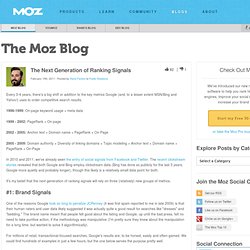

TweetSERPing: Using Twitter for SEO – BrightonSEO Video. Written by Craig Charley – Thu 24 Apr 2014 We always look forward to the panel debates at BrightonSEO as the discussion is more open.
It's even better when they involve ex-members of the Google Search Quality team (and a "former" spammer). Moderated by theMediaFlow's Nichola Stott, this year's panel included Fili Wiese and Kaspar Szymanski, both ex-Google turned SEO Consultant, and Gareth Hoyle, representing LinkRisk. The topics included the disavow file, link removals, manual & algorithmic penalties, negative SEO, the definition of a bad link and how Google treats penalised sites.
If I was to sum up the discussion with one quote it would be from Gareth's snappy catchphrase: "Made for SEO, Has to Go" You can watch the full panel discussion below, or read our summary of the main points if you are short for time. Read More Written by Andy Trainer – Sun 13 Apr 2014 This tutorial is an extract from our popular 1-day Advanced Excel course. Excel has two Lookup functions; Vertical and Horizontal.
What Social Signals Do Google & Bing Really Count? Both Google and Bing have added many social search features over the past year.

There’s also been talk about using “social signals” to help rank regular search results. But are either of the major search engines actually using those social signals to rank regular search results? A bit, they tell me. In particular, your stature on Twitter could help influence how a page ranks in web search. I gave Bing and Google six questions about how they use social data from Twitter and Facebook. Social Search Ranking… For example, both Google and Bing offer a way to see results that are written by or shared by your friends, search that’s directly influenced by people you know: Both Google and Bing also offer a way to see content being shared in real time on the social networks: …Isn’t Web Search Ranking For example, Google uses more than 200 different “signals” to decide how rank those pages, in response to any search.
There are many other factors beyond those I’ve listed. Web Page Authority Vs. The Next Generation of Ranking Signals. Every 3-4 years, there's a big shift or addition to the key metrics Google (and, to a lesser extent MSN/Bing and Yahoo!)

Uses to order competitive search results. 1996-1999: On-page keyword usage + meta data 1999 - 2002: PageRank + On-page 2002 - 2005: Anchor text + Domain name + PageRank + On-Page 2005 - 2009: Domain authority + Diversity of linking domains + Topic modeling + Anchor text + Domain name + PageRank + On-Page In 2010 and 2011, we've already seen the entry of social signals from Facebook and Twitter. It's my belief that the next generation of ranking signals will rely on three (relatively) new groups of metrics. #1: Brand Signals One of the reasons Google took so long to penalize JCPenney (it was first spam reported to me in late 2009) is that their human raters and user data likely suggested it was actually quite a good result for searches like "dresses" and "bedding. " So what types of signals might Google employ to determine if a site is a "brand" or not?
#2: Entity Associations.